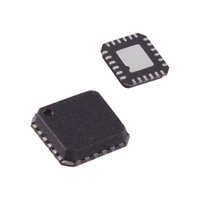ADL5371ACPZ-R7 Analog Devices Inc, ADL5371ACPZ-R7 Datasheet - Page 13

ADL5371ACPZ-R7
Manufacturer Part Number
ADL5371ACPZ-R7
Description
IC,RF Modulator,LLCC,24PIN,PLASTIC
Manufacturer
Analog Devices Inc
Datasheet
1.ADL5371ACPZ-R7.pdf
(20 pages)
Specifications of ADL5371ACPZ-R7
Design Resources
Interfacing ADL5371 to AD9779A Dual-Channel, 1 GSPS High Speed DAC (CN0017)
Function
Modulator
Lo Frequency
500MHz ~ 1.5GHz
Rf Frequency
500MHz ~ 1.5GHz
P1db
14.4dBm
Noise Floor
-158.6dBm/Hz
Output Power
7.6dBm
Current - Supply
200mA
Voltage - Supply
4.75 V ~ 5.25 V
Test Frequency
900MHz
Package / Case
24-VFQFN, 24-CSP Exposed Pad
Lead Free Status / RoHS Status
Lead free / RoHS Compliant
Other names
ADL5371ACPZ-R7TR
Available stocks
Company
Part Number
Manufacturer
Quantity
Price
Company:
Part Number:
ADL5371ACPZ-R7
Manufacturer:
Bussmann
Quantity:
500
Part Number:
ADL5371ACPZ-R7
Manufacturer:
ADI/亚德诺
Quantity:
20 000
APPLICATIONS INFORMATION
DAC MODULATOR INTERFACING
The ADL5371 is designed to interface with minimal components
to members of the Analog Devices family of DACs. These DACs
feature an output current swing from 0 to 20 mA, and the
interface described in this section can be used with any DAC
that has a similar output.
Driving the ADL5371 with a TxDAC®
An example of the interface using the
in Figure 27. The baseband inputs of the ADL5371 require a dc
bias of 500 mV. The average output current on each AD9779
output is 10 mA. Therefore, a single 50 Ω resistor to ground
from each DAC output results in an average current of 10 mA
flowing through each resistor, thus producing the desired
500 mV dc bias for the inputs to the ADL5371.
Figure 27. Interface Between the AD9779 and ADL5371 with 50 Ω Resistors to
The AD9779 output currents have a swing that ranges from 0 to
20 mA. With the 50 Ω resistors in place, the ac voltage swing
going into the ADL5371 baseband inputs ranges from 0 V to 1 V.
A full-scale sine wave out of the AD9779 can be described as a
1 V p-p single-ended (or 2 V p-p differential) sine wave with a
500 mV dc bias.
LIMITING THE AC SWING
There are situations when it is desirable to reduce the ac voltage
swing for a given DAC output current. This can be achieved
through the addition of another resistor to the interface. This
resistor is placed in shunt between each side of the differential
pair, as shown in Figure 28. It has the effect of reducing the ac
swing without changing the dc bias already established by the
50 Ω resistors.
AD9779
Ground to Establish the 500 mV dc Bias for the ADL5371 Baseband Inputs
OUT1_P
OUT1_N
OUT2_N
OUT2_P
93
92
84
83
RBQN
RBQP
RBIN
RBIP
50Ω
50Ω
50Ω
50Ω
AD9779
23
24
TxDAC is shown
19
20
QBBN
QBBP
IBBN
IBBP
F-MOD
Rev. 0 | Page 13 of 20
The value of this ac voltage swing-limiting resistor is chosen
based on the desired ac voltage swing. Figure 29 shows the
relationship between the swing-limiting resistor and the peak-
to-peak ac swing that it produces when 50 Ω bias-setting
resistors are used.
FILTERING
It is necessary to low-pass filter the DAC outputs to remove
images when driving a modulator. The interface for setting up
the biasing and ac swing discussed in the Limiting the AC
Swing section lends itself well to the introduction of such a
filter. The filter can be inserted between the dc bias-setting
resistors and the ac swing-limiting resistor. Doing so establishes
the input and output impedances for the filter.
AD9779
Figure 29. Relationship Between the AC Swing-Limiting Resistor and the
OUT1_N
OUT2_N
OUT1_P
OUT2_P
Figure 28. AC Voltage Swing Reduction Through the Introduction
2.0
1.8
1.6
1.4
1.2
1.0
0.8
0.6
0.4
0.2
Peak-to-Peak Voltage Swing with 50 Ω Bias-Setting Resistors
0
10
92
of a Shunt Resistor Between the Differential Pair
93
84
83
RBQN
RBQP
RBIN
RBIP
50Ω
50Ω
50Ω
50Ω
100
R
L
(Ω)
RSLQ
100Ω
100Ω
RSLI
1000
23
24
19
20
ADL5371
QBBN
QBBP
IBBN
IBBP
F-MOD
10000













